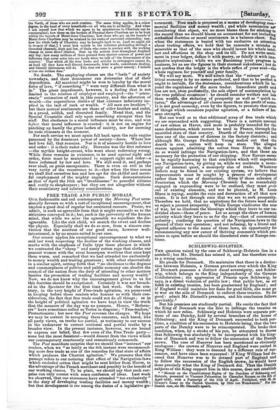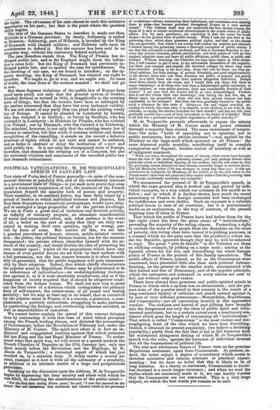SCHLESWIG-HOLSTEIN.
THE question raised by the case of Schleswig-Holstein lies in a nutshell; but Mr. Disraeli has missed it, and has therefore come to a wrong conclusion.
He pleads for Denmark. He maintains that there is a distinc- tion between Holstein, a German province over which the King of Denmark possesses a distinct ducal sovereignty, and Schles- wig, which belongs to the King independently of the German Confederation ; the aggression of Prussia upon Schleswig, he says, is a direct violation of public law ; that public law, as set forth in existing treaties, has been guaranteed by England ; and if England would maintain her fame for good faith, she must go to war on the side of Denmark to enforce those treaties. So far good : admit Mr. Disraeli's premises, and his conclusion follows inevitably
But his premises are studiously partial. He omits the fact that the King of Denmark was the first to infringe the treaties on which he now relies. Schleswig and Holstein were separate por- tions of one Dutchy, held by several branches of the house of Oldenburg; and the King of Denmark succeeded to both por- tions, a condition of his succession to Holstein being, that the two parts of the Dutchy were to be reincorporated. He broke that condition, when, by a stroke of his pen, he attempted to decree that Schleswig was absolutely to be incorporated with his king- dom of Denmark and was to follow the succession of the Danish crown. The case of Hanover has been mentioned as obviously analogous : the crowns of Hanover and England were united in King William : they were to descend by a different rule of suc- cession, and have since been separated : if King William had de- creed that Hanover was to be deemed part of England and to follow the succession of the English crown, he would have done precisely what the King of Denmark did. That the Danish subjects of the King support him in this course, does not establish • "Memoir on the Constitutional Eights of the Datchies of Schleswig and Holstein presented to Viscount Palmerston by Chevalier Bunsen on the 8th of April 1848; with a Postscript of the 15th of April. Published, with M. de Gruner's Essay on the Danish Question, by Otto von Wenekatern." For the Danish case, see Mr. Disraeli's speech. his right. The advocates of his case choose to omit this initiative aggression on his part; but that is the point where the question retina' begins. Thetitle of the German States to interfere is made out thus. Holstein is a German province: by treaty, Schleswig is united to Holstein: Schleswig, part of Holstein, is invaded by the King of Denmark with Danish soldiers ; and Holstein calls upon its confederates to defend it. But the succour has been sent in an irregular way, without the customary federal authority. The case therefore stands thus. The King of Prussia has in- fringed public law, and so far England might deem the infrac- tion a castes belli : but the King of Denmark had previously in- fringed public law, and so spoiled the case for interference. On the showing of one case, we are bound to interfere ' • on the op- posite showing, the King of Denmark has vitiated our right to interfere. We ought to go to war, and we ought not. In cases of doubt, the least done is the soonest mended : we shall not go to war.
But these flagrant violations of the public law of Europe heap proof upon proof, not only that the general system of treaties, whether devised or revised in 1815, is inapplicable to the existing state of things, but that the treaties have been so infringed by the parties interested that they have lost even technical validity. We are not aware of any party that can plead the existing treaty law of Europe. It cannot be pleaded in Lombardy by Austria, who has violated it in Gallicia ; in Savoy by Sardinia, who has violated it in Lombardy ; in Holstein by Prussia, who has violated it in Poland ; nor by Denmark, who has violated it in Schleswig. The mischief, however, is not only that the existing treaty law of Europe is cancelled, but that while it remains without any formal recognition of the cancelling, it stands on the record a delusive phantom of rights which do not exist and cannot be enforced, and so helps to obstruct or delay the institution of a new and valid public law. It is not only the disorganized state of Europe, therefore, that demands the revising act of a Congress, but also the universal vitiation and annulment of the recorded public law that demands reenactment.



























 Previous page
Previous page